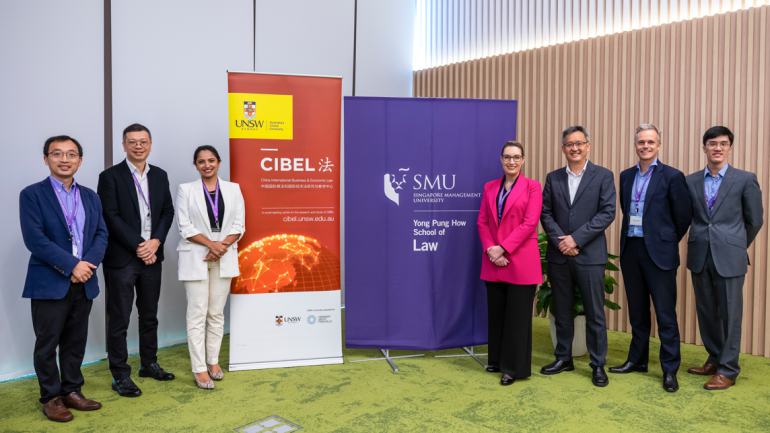25 November 2022
By Hanna Jez & Xue (Sophia) Bai
On Wednesday 31 August, the CIBEL-CCLA Conference on Sustainable Banking and Financial Regulation in Asia: Principles, Practice and Innovation was held in Singapore. This hybrid event was jointly organised by the CIBEL Centre and Singapore Management University (SMU) Centre for Commercial Law in Asia and was supported by the Chinese Journal of Comparative Law. Industry stakeholders, regulators, and legal experts took part, discussing the latest developments on important topics in the age of digital currency and finance.
Professor Lee Pey Woan, Dean of the Yong Pung How School of Law at Singapore Management University welcomed participants to the conference, and noted the importance of Singapore’s diverse cultures, placing the country at the centre of important conversations and developments concerning the future of Asia. Singapore Management University, in return, has been focussing on research in relation to global shifts and trends in sustainability.
Professor Andrew Lynch, Dean of the University of New South Wales Faculty of Law and Justice also spoke and stated that CIBEL is an organisation that facilitates connection and transformation due to its strong global academic networks.
The Honourable Justice Ang Cheng Hock gave the session’s opening remarks, providing the audience with information on the status of financial regulation and sustainable banking in Singapore from the perspective of a judge of the High Court of Singapore. Using case studies involving Bitcoin and NFTs, his Honour queried whether cryptocurrency should be recognised as property under Singapore law. His Honour ultimately concluded that technological and financial advancements must be seriously considered from a legal perspective.
The Industry Panel had Ms Ipshita Chaturvedi, Partner at Dentons Rodyk, as moderator.
Mr Howard Silby, Chief Innovation Officer at the National Australia Bank (NAB), shared his perspective on the future of financial services. He highlighted three important topics dominating the future of sustainable development: treatment and adoption of digital assets, increased use of open data/finance regimes, and climate considerations. Howard believes his bank has a very important role in the sustainability of the Australian agriculture scene and that blockchain will support the organisation in reaching its sustainability goals.
Mr Tan Boon Gin, Chief Executive Officer of Singapore Exchange Regulation, then spoke about the varied nature and risks of different cryptoassets and how the Basel Committee on Banking Supervision’s (BCBS) consultation on the proposed prudential treatment of cryptoasset exposures based on their characteristics, is useful as a reference point.
Ms Natalie Curtis of Herbert Smith Freehills shared insights into her work on Greenwashing cases and Sustainability. Natalie explained that the term greenwashing generally refers to ‘inaccurate ESG or sustainability-related statements and disclosures.’ She pointed out that untruthful or inaccurate ESG-related statements could attract claims for misleading or deceptive conduct, among other litigation risks. Natalie explored cases such as Australasian Centre for Corporate Responsibility (ACCR) v Santos and Allbirds v PETA and provided guidance on the ways that the risk of greenwashing may be mitigated in practice.
Finally, Mr Lam Chee Kin from DBS Bank pitched ideas about research and the deployment of skills in the face of regulating digital finance and practicing sustainability. Chee Kin led his presentation with the observation that he does not see digitalisation and sustainability as two different concepts – rather – the appropriate digital future is consistent with sustainability.
Academic Panel 1 addressed Sustainability and Regulation in the Banking and Financial Sectors. It featured presentations from Mr Robert Chalmers (Flinders University), Associate Professor Xichen Li (Xihua University), Dr George Tian (University of Technology, Sydney), Professor Deborah Healey (UNSW), and Assistant Professor Nydia Remolina Leon (SMU) as well as a welcome and introduction from Assistant Professor Lau Kwan Ho (SMU). Topics covered included financial services governance, smart contracts, and competition law.
The last presentations for the day in Academic Panel 2 involved experts exploring Green Innovation and Harmonisation in the (Crypto)finance World. This session was moderated by UNSW Professor Heng Wang. Mr Ian Kwek (Legis Point LLC), Dr I-Ju Chen (University of Birmingham), Assistant Professor Stefanie Schacherer (SMU), Associate Professor Christian Hofmann (NUS), Ms Lisa-Marie Ross (NUS), Mr Tony Song (UNSW Sydney), and Associate Professor Jason Grant Allen (SMU) presented on stablecoins, crypto assets, sustainable development and more.
You can find the recordings for Academic Panel 1 & 2 on our video page.
